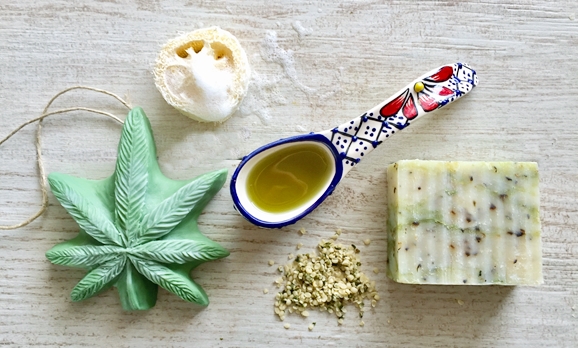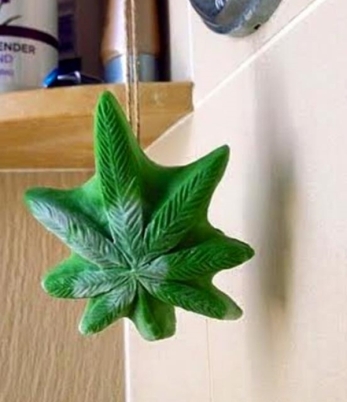5 Reasons Why You Should Try Hemp Oil Instead of Coconut Oil For Dry Skin This Winter.
Posted by Dope on a Rope Soap Blog on
Ah, yes…and just like that, it’s FALL, Y’ALL! With the beautiful changing autumn leaves comes the not-so-beautiful changing of our skin’s ability to retain moisture…and right when you think you have it under control, old man winter swoops in with a vengeance!

What gives, you might wonder? A number of factors are actually at play – winter wind, along with dry indoor air, low humidity both inside and out, and a surprise cold-weather sunburn can draw moisture from your innocent little dermis. Even here in Florida, where our “winters” are laughable (think lows in the 70s…brrrr), we can definitely tell a difference in our skin as humidity levels drop.
Sooooo, what to do?

When we lived out in Colorado at 8,500 feet, I had the driest skin I’ve ever had. Flaky, scaly, and often itchy…and it wasn’t eczema or psoriasis, it was simply my dermis and epidermis yelling “Hey! I’m just your body’s largest organ and I’m freaking out with all of these elements coming at me! Help!”
Well, I listened and would attempt to combat dry skin with a plethora of remedies. Cocoa butter. Castor oil. Olive oil. Homemade potions and lotions of sorts. Slathering on a lot of coconut oil, which became my favorite go-to natural moisturizer for years…until I found hemp seed oil. Read on to find out why I prefer hemp oil over coconut oil for my dry skin.
1. Hemp oil does not clog pores.
Hemp seed oil scores a 0 on the comedogenic scale, which is a good thing. This means it is entirely non-comedogenic and will not clog pores, even with acne-prone skin. Coconut oil actually scores a 4, meaning it’s a moderately comedogenic oil, giving it a greater chance at clogging pores (…the only place where clogging is appropriate is at an Irish bar!).
2. Hemp oil contains more essential fatty acids.
Did you know? Hemp seed oil is composed of nearly 85 percent essential fatty acids (EFAs) alone and offers the richest, most balanced natural source of EFAs. Essential fatty acids play a large role in combating dryness and can even help prevent premature aging. Luckily hemp oil is bursting with a good balance of omega-3 and omega-6. In fact, it contains a bit more essential fatty acids than coconut oil.
3. Reduces inflammation and soothes skin faster.
As hemp seed is more absorbent than coconut oil, it may also reduce inflammation quicker. In my personal experience with dryness and itchiness, the application of hemp oil soothes my skin longer than coconut oil (again, an observation, the oils could work differently on your skin type). We have also had numerous soap customers report that hemp oil has worked wonders at relieving their skin conditions such as eczema and psoriasis, more specifically our Lemongrass Hemp Soap.
4. It’s more absorbent than coconut oil.
Another bonus of having a high concentration of essential fatty acids is that the oil gets absorbed very fast by our skin. Hemp oil is absorbed quickly, feels light on the skin, and can even be worn under makeup. Our skin just drinks it right up! I also like to use a bit of essential oils plus hemp seed oil on my arms/legs/shoulders, as the hemp oil carries the essential oils into my skin for extra nourishing.
5. Hemp oil is more sustainable.
If you’re concerned about sustainability and your environmental footprint, hemp oil may be a better choice for you than coconut oil. Hemp is a densely growing plant, meaning it does not need a lot of land to grow on. It is naturally resistant to most pests, and damaging chemical herbicides aren’t necessary as the hemp plant literally chokes out competing plants. The hemp plant grows rapidly and is very self-compatible, which means it can be grown several years in a row in the same fields. Alternatively, coconut trees can become less efficient as the coconut tree ages, resulting in very high maintenance and harvesting costs. A coconut palm will produce 50 to 200 coconuts per year until it is about 80 years old. It takes around 8 of these coconuts to produce 32 oz. of coconut oil.
Now, I still use coconut oil in many of my daily regimes, such as deodorant and smoothies, but I find hemp oil benefits me best during these drying winter months.
Use topically or internally! Suggested way to use hemp oil as a moisturizer: Splash warm water on your face and body, and massage gently into skin. Towel dry off. Remember, a little goes a long way! Hemp oil can also be added to smoothies as well as dressings.
If you’d like to try more hemp products, head over to www.dopeonaropesoap.com.
*All information in this blog is not certified by a physician, and is author’s opinion only (I am not a doctor!).

Share this post
- Tags: Bath and Beauty, Benefits, coconut oil, dry skin, Health, Hemp, Hemp Oil, moisturizers, Skin Care, Uncategorized, Wellness, winter
